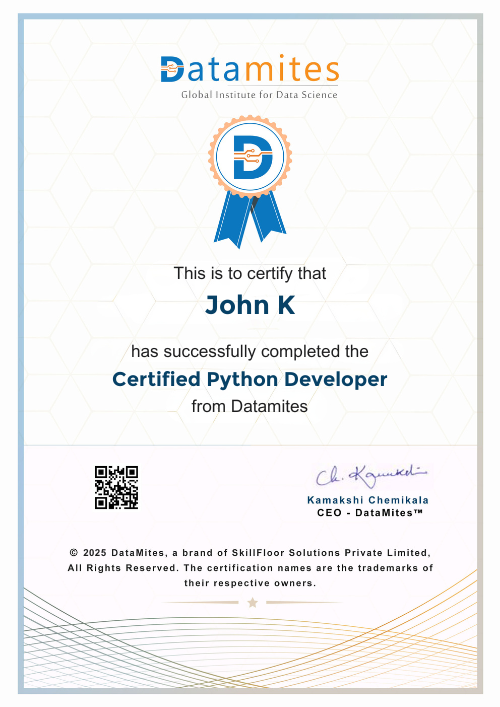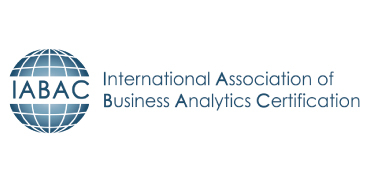Instructor Led Live Online
Self Learning + Live Mentoring
Customize Your Training

• Introduction of python
• Installation of Python and IDE
• Python Variables
• Python basic data types
• Number & Booleans, strings
• Arithmetic Operators
• Comparison Operators
• Assignment Operators
• IF Conditional statement
• IF-ELSE
• NESTED IF
• Python Loops basics
• WHILE Statement
• FOR statements
• BREAK and CONTINUE statements
• Basic data structure in python
• Basics of List
• List: Object, methods
• Tuple: Object, methods
• Sets: Object, methods
• Dictionary: Object, methods
• Functions basics
• Function Parameter passing
• Lambda functions
• Map, reduce, filter functions
• Decorators
• Generators
• Context Managers
• Metaclasses
• Inheritance and Polymorphism
• Encapsulation and Abstraction
• Class methods and static methods
• Special (magic/dunder) methods
• Property decorators - getters, setters, and deletes
• Working with files
• Reading and writing files
• Buffered read and write
• Other file methods
• Logging & Debugger
• Modules and import statements
• SQL Basics
• Creating DB Table
• INSERT, READ, UPDATE, DELETE
• Introduction to MongoDB
• CRUD operations in MongoDB
• namedtuple(), deque, ChainMap,
• Counter, OrderedDict, defaultdict,
• UserDict, UserList, UserString
• Exceptions handling with try-except
• Custom exception handling
• List of general use exception
• Best practice exception handling
• Generators, Iterators
• The Functions any and all
• With Statement
• Data Compression
• A Daytime Server
• Clients and Servers
• The Client and Server Programs
• Classes and Threads
• Multi-threading; thread life cycle
• Regular Expression Syntax
• Group, Split and wildcards
• Quantifiers
• Match, Search and Find all methods
• Character Sequence
• Introduction to OpenCV, Installation
• Basic Operations on Images
• Image Filtering
• Image Classification
• Introduction to GIT
• Basic Git commands
• Introduction to Flask and Installation
• Creating project
• Routing,templates, forms and database integration
• Deployment on render
• Django Introduction and Installation
• Creating a Project
• Django Architecture and File Structure
• Folder Structure, First Django project
• Database and Views, Static Files and Forms
• URL Mapping and Routing
• Defining Models and Relationships
• Database Migrations and Schema Changes
• Querying Data using Django ORM
• Model Forms and Form Validation
• HTML Forms in Django
• Model Forms and Form Validation
• Formsets and Inline Formsets
• File Uploads and Validation
• Deploying Django Applications
• Hosting Options (e.g., Heroku, AWS)
• Project Showcasing and Review
Python stands out due to its versatility and simplicity, making it a favourite among developers for a wide range of tasks.
To install Python, you can visit the official Python website, download the installer, and follow the installation prompts provided.
The preference between Python and Java varies depending on the context. While Python is loved for its simplicity and flexibility, Java is often favored for its performance and scalability, especially in enterprise settings.
Python 2 development and support have ceased, while Python 3 continues to receive active maintenance, offering syntax enhancements and additional features.
Beginners can effectively learn Python through various means, including online tutorials, interactive coding platforms, books, and engagement with coding communities.
Python proves invaluable in data science pursuits through libraries like Pandas, NumPy, and scikit-learn, simplifying tasks such as data manipulation, analysis, and machine learning.
Python frameworks offer pre-written code and libraries to streamline development tasks within specific domains, such as web development (e.g., Django, Flask) or GUI applications (e.g., Tkinter).
Effective debugging of Python code can be achieved through methods such as using print statements, employing debugging tools like PDB or IDE debuggers, and carefully analyzing error messages.
Python is more versatile, catering to a wider range of applications, while R specializes in statistical analysis with comprehensive packages tailored specifically for that purpose.
The demand for Python developers in Belgium has been steadily increasing due to Python's popularity in web development, data science, and automation sectors.
While Python certifications can validate skills, practical experience and projects often carry more weight in the eyes of employers.
Crafting a compelling resume involves highlighting relevant Python projects, showcasing problem-solving abilities, and emphasizing specific technical skills and achievements.
Preparing for Python developer interviews involves reviewing algorithms, practicing coding challenges, and demonstrating a clear understanding of Python concepts and best practices.
While a formal degree is sometimes required, practical skills and experience often outweigh academic qualifications in the field of Python development.
The primary responsibilities of a Python developer include developing applications, implementing algorithms, troubleshooting issues, and collaborating within a team setting.
Transitioning into a Python developer role entails acquiring relevant skills through online courses, bootcamps, or self-study, building a project portfolio, and networking within the industry.
Python is extensively used in data science for tasks such as data manipulation, analysis, visualization, machine learning, and statistical modeling.
Python is employed in artificial intelligence for tasks such as natural language processing, computer vision, developing machine learning algorithms, and constructing neural networks.
Major corporations such as Google, Facebook, Amazon, and Netflix rely extensively on Python across their operations, utilizing it for web development, data analysis, automation, and machine learning initiatives.
The salary of a Python developer in Belgium ranges from EUR 5,323 per year according to a Glassdoor report.
In Belgium, DataMites serves as a beacon for Python enthusiasts, offering personalized learning paths, seasoned mentors, and adaptable teaching approaches. Whether diving into Python for the first time or seeking skill refinement, DataMites provides hands-on projects and dedicated career guidance to propel individuals forward on their Python odyssey.
Python training with DataMites in Belgium is esteemed for its immersive approach, tailored to master this versatile programming language. With an emphasis on practical learning, participants acquire indispensable skills essential for thriving in the dynamic tech landscape.
The Python Developer Course in Belgium spans four months, comprising 20 hours of live online sessions and 400 hours of self-paced study.
Python Developer Training with DataMites in Belgium welcomes individuals from diverse educational backgrounds, including graduates, postgraduates, and alumni of high schools. The program caters to beginners, laying a solid foundation in Python fundamentals.
DataMites introduces Flexi-Pass for Python training in Belgium, granting participants a three-month window to access training sessions. This flexibility allows for revisiting materials, attending extra sessions, and addressing queries to meet individual learning objectives.
The DataMites Certified Python Developer Course in Belgium offers comprehensive training, spanning from basic to advanced Python concepts, equipping learners with proficient skills.
The Python for Data Science Course in Belgium caters to individuals with varying programming backgrounds, addressing crucial topics such as data manipulation, machine learning algorithms, and programming techniques essential for data analysis.
The Data Mining with Python Course in Belgium focuses on extracting insights from vast datasets to drive predictive analytics, a vital component of Data Science requiring diverse skills for effective data analysis.
The Python for Machine Learning Course introduces participants to various machine learning algorithms and their practical implementation using Python, particularly leveraging the Scikit-Learn package.
The Deep Learning with Python Course delves into deep learning principles using Python and the Keras library, exploring theoretical foundations and practical applications across domains like computer vision and natural language processing.
DataMites offers Python training fees in Belgium ranging from EUR 159 to EUR 403
Yes, DataMites offers Python courses in Belgium inclusive of internship opportunities, allowing participants to gain real-world experience and apply their Python skills professionally, thereby enhancing employability.
Upon completing Python classes in Belgium, participants receive the prestigious IABAC® certification, globally recognized for validating proficiency in Python programming.
Participants need to present valid photo identification, such as a National ID card or driver's license, for Python training sessions in Belgium.
Yes, DataMites provides project opportunities as part of Python training in Belgium, including 10 capstone projects and 1 client project, enabling participants to apply Python skills in real-world scenarios.
Participants missing Python training in Belgium can access recorded sessions and course materials online through DataMites' platform. Makeup sessions can also be arranged to ensure continuous learning progress.
Tools covered in Python developer training by DataMites in Belgium include Anaconda, Python, PyCharm, Flask, NumPy, Pandas, and Google Colab.
Yes, interested individuals can attend a complimentary demo class to experience the training firsthand and understand its structure.
Career mentoring sessions, facilitated by the DataMites Placement Assistance Team (PAT), guide participants in Data Science career prospects, addressing challenges and offering strategies for corporate success.
Yes, DataMites offers help sessions to enhance understanding of specific Python topics, ensuring participants grasp concepts effectively.
The DataMites Placement Assistance Team(PAT) facilitates the aspirants in taking all the necessary steps in starting their career in Data Science. Some of the services provided by PAT are: -
The DataMites Placement Assistance Team(PAT) conducts sessions on career mentoring for the aspirants with a view of helping them realize the purpose they have to serve when they step into the corporate world. The students are guided by industry experts about the various possibilities in the Data Science career, this will help the aspirants to draw a clear picture of the career options available. Also, they will be made knowledgeable about the various obstacles they are likely to face as a fresher in the field, and how they can tackle.
No, PAT does not promise a job, but it helps the aspirants to build the required potential needed in landing a career. The aspirants can capitalize on the acquired skills, in the long run, to a successful career in Data Science.



